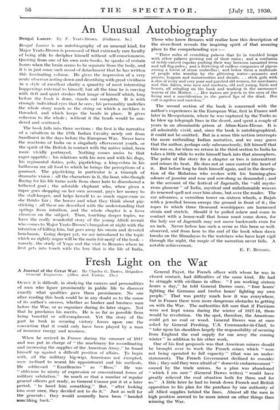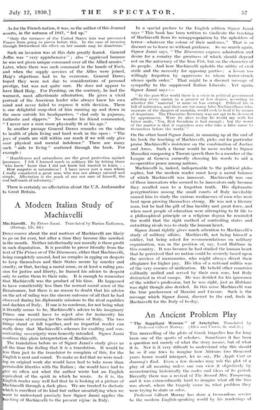Fresh Light on the War
OrrEN it is difficult, in 'studying the careers and personalities of men who figure prominently in public life to discover exactly What qualities gave them prominence. No one after reading this book could be in any doubt as to the cause of its author's success, whether as banker and business man before the War, or as organizer during its later stages. Not that he proclaims his merits. He is as far as possible front being boastful or self-complacent. Yet the story of the part he took in securing victory forces upon one the conviction that it could only have been played by a man of immense energy and resource.
When he arrived in France during the summer of 1917 - and was put in charge of " the machinery for co-ordinating and increasing the supplies of the American Army," lie found himself up against a difficult position of affairs. To begin wills all the military big-wigs, Americans not excepted, were inclined to resent his appointment and his methods. He addressed " Excellencies " as "Boss." He was "oblivious to nicety of expression or conventional forms of military salutation." So much so that a number of regular general officers got ready, as General Connor put it at a later period, '• to hand him something." But, "after looking him over once, they decided not to do it." Just as well for the generals : they would assuredly have been "handed 9ourAlsing back."
General Payot, the French officer with whom lie was in closest contact, had difficulties of the same kind. He had to struggle with civilians in office. "I am working sixteen hours a day," he told General Dawes once, "four hours' fighting the Germans and twelve hours' fighting my own people." That was pretty much how it was everywhere, but in France there were more dangerous obstacles to getting on with the War. The authorities felt sure that if Parisians were not kept warm during the winter of 1917-18, there would be revolution. On the spot, therefore, the Americans could get no coal or wood. General Dawes was at once asked by General Pershing, U.S. Commander-in-Chief, to take upon his shoulders largely the responsibility of securing front England the coal supply for our army the coming winter" in addition to his other work.
One of his first proposals was that American miners should be brought over to work the French mines which "were not being operated to full capacity" (that was an under- statement). The French Government declined to consider this ; they said they were afraid of domestic embarrassment" caused by the trade unions. So a plan was abandoned "which I am sure" (General Dawes writes) "would have greatly relieved the coal situation both for them and for us." A little later he had to break down French and British opposition to his plan for the purchase by one authority of all Allied supplies behind the lines. Almost all the men in high position seemed to be more intent on other things than winning the War. As for the French nation, it was, so the author of this Journal asserts, in the autumn of 1917, "fed up."
"Only the entrance of the United States into war prevented France from going to pieces before this. In the ease of invasion through Switzerland the effect on her morale may be disastrous."
Such an invasion was at this date greatly feared. General Joffre was "very apprehensive " ; also " aggrieved because he was not given unique command over all the Allied armies:' Later, when there was such command in the hands of Foch, and when the supply services of the Allies were joined, Haig's objections had to be overcome. General Dawes hoped they were not due to considerations of personal prestige, but was not quite sure. He does not appear to have liked Haig. For Pershing, on the contrary, he had the warmest, most affectionate admiration. He gives a vivid portrait of the American leader who always knew his own mind and never failed to express it with decision. There is one delightful snap-shot of him running up and down in the snow outside his headquarters," clad only in pajamas, bathrobe and slippers." No wonder his friend commented, "I never saw a man snore physically fit at his age."
In another passage General Dawes remarks on the value to health of plain living and hard work in the open : "The joys of youth are still within our reach if we will only give over physical and mental indolence." There are many such "aids to living" scattered through the book. For example :
" Humbleness and naturalness are the great protection against ignorance. I felt I learned much in military life by letting those 'who knew' know that I did not know but wanted to learn. . .
How majestic is naturalness ! I have never met a man whom I really considered a great mall who was not always natural and simple. Affectation is the mark of one not sure of himself, the real hall-mark of inferiority."
There is certainly no affectation about the U.S. Ambassador to Great Britain.





































 Previous page
Previous page